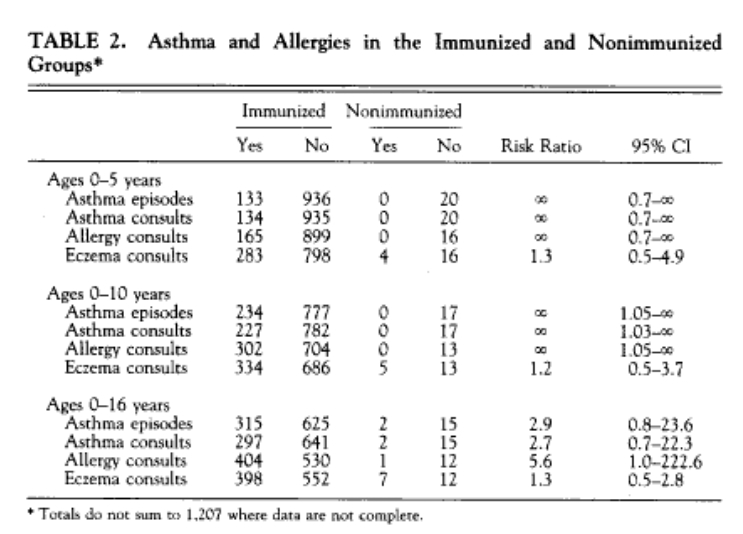This is the second part of my article on vaccines and allergies. The first part is here:
The pertussis vaccine and allergy - First part
Question: Why should the vaccines have anything to do with allergies?
Answer: Because in recent decades the prevalence has increased while the number of vaccines.
This brings to mind a very informative research:
Paediatr Perinat Epidemiol. 2004 Jan; 18 (1) :88-92.
New evidence for the theory of the stork
Höfer T et al.
Federal Institute for Risk Assessment, Berlin, Germany
New evidence for the theory of the stork
Höfer T et al.
Federal Institute for Risk Assessment, Berlin, Germany
This study found a significant correlation between the population of storks and the number of births. There were fewer storks, fewer children were born. Here is proof that storks bring children ..... or not?
And also this:
The Simpsons Season 7 Episode 23, Code
3F20 Much Apu About Nothing
Lisa Simpson et al.
Homer: Ah, not even a bear in sight: the patrol is working bears the wonder
Lisa: That's specious reasoning, Dad
Homer: Thank you darling
Lisa: According to your logic, this stone could keep away the tigers
Homer: Oh, how it works?
Lisa: It does not work. It 's just a stupid rock, still do not see any tigers, do you?
Homer: Ah!
Lisa: It 's just a stupid rock ...
Homer: Ah
Lisa: But I do not see any tigers, do you?
Homer: Lisa, I want to buy your stone
And also this:
The Simpsons Season 7 Episode 23, Code
3F20 Much Apu About Nothing
Lisa Simpson et al.
Homer: Ah, not even a bear in sight: the patrol is working bears the wonder
Lisa: That's specious reasoning, Dad
Homer: Thank you darling
Lisa: According to your logic, this stone could keep away the tigers
Homer: Oh, how it works?
Lisa: It does not work. It 's just a stupid rock, still do not see any tigers, do you?
Homer: Ah!
Lisa: It 's just a stupid rock ...
Homer: Ah
Lisa: But I do not see any tigers, do you?
Homer: Lisa, I want to buy your stone
not only not Homer Simpson always easy to tell if a correlation is only temporal or causal instead. Especially in the field of alternative medicine so many make their living by exploiting and sometimes unconsciously aware of the inclination of people to see causality where there is only a correlation incece like the rock of Lisa Simpson. There are many people who would buy that stone, and unfortunately there are many other people who know it and then sell it (of course a bit better 'sales techniques Lisa ;-)), just need to place instead of a tiger malattie.Vi long list of advice to follow the blog Medbunker it has already examined the effectiveness of many "stones". Look for the series of video conference in 12.2.11 CICAP of Lugano, where the author of the blog Medbunker said very interesting things about the so-called alternative medicine. The link is currently in the top right of my blog.
If no one believes the stork, even Homer, because we know where babies come from. But with diseases whose causes are unknown, such as allergies, autoimmune diseases, autism, etc.. there is open field for speculation, such as allergies that cause the increase in vaccinations. Or was it the other way around? Okay, correlation is always ...
therefore continues through the book "Children supervaccinati" Eugene Serravalle. Immediately after the example that I discussed in my previous post, we read (on page 38, under "What do they reveal the research on adverse reactions to vaccines?")
therefore continues through the book "Children supervaccinati" Eugene Serravalle. Immediately after the example that I discussed in my previous post, we read (on page 38, under "What do they reveal the research on adverse reactions to vaccines?")
Another study conducted on 1,265 children in New Zealand confirms that vaccination may be a risk factor for allergic reactions. Children who were not vaccinated and DTP antipoliemielite had not presented clinical manifestations of allergy before age 10, while among the vaccinated, 23.1% reported episodes of asthma, 22.5% had received medical examinations for asthma, 30% for other allergic diseases.
Epidemiology. November 1997, 8 (6) :678-80.
Is infant immunization a risk factor for childhood asthma or allergy?
Kemp T et al
Department of Medicine, Wellington School of Medicine, New Zealand.
This is a cohort study. The authors examined the relationship between the DTP vaccine (diphtheria, tetanus, pertussis) and OPV (oral polio) and allergies. Information on vaccinations and allergic symptoms were collected for 1,265 children born in 1977 who participated in the New Zealand Health Study and were followed until the age of 16 years. The information was collected through diaries kept by parents and doctors - when the data obtained from parents were unclear - boards doctors. The data obtained were divided into three periods: 0-5, 0-10 and 0-16 years. The 23 (!) Children who had received neither the vaccine nor the DPT polio at the age provided for in the vaccination schedule, ie 3 and 5 months, were classified as "unvaccinated." Any vaccines (DTP and OPV) after one year of age were not considered because the hypothesis of the authors was limited to vaccinations received during early childhood.
Until the age of 10 years for children classified as not vaccinated were not reported asthma episodes or medical consultations for asthma or other allergies. When exams were taken in data collection between 0-16 years, among children classified as not vaccinated, there were 5 episodes / consultations for allergies and asthma. For this age group the difference in the incidence of asthma and other allergies among vaccinated and unvaccinated was not statistically significant.
As a control, the researchers also compared the possible link between measles vaccine and allergic diseases but have not found statistically significant differences between vaccinated and unvaccinated.
The result of this study is to be taken with due caution, especially because the number of unvaccinated children was very small. Even one case of asthma reported between 0 and 10 years have significantly affected the outcome. Another limitation of the study was a potential bias for the use of medical care (you remember the explanation of the study by DeStefano in the previous post?) This is more the result of the difficulty of adjusting for confounding factors, because of the small number of unvaccinated children and the quality of diagnosis.
E 'rather strange that in the abstract the authors report only the results obtained up to 10 years and not until 16 years. If you take into account the results obtained up to 16 years, there have also been cases of asthma among children classified as "unvaccinated." On 17 of which we have data, 2 had at least one episode of asthma, and the marginal relative risk was found in children up to 10 years, is gone. The association was not statistically significant. Also write in the abstract
that 23 children had asthma or other allergies in the first 10 years of life, while in the study you can see that from the beginning are missing data for some of this already small number of children. In fact, in the age group between 0 and 5 only 20 there is an answer about asthma and eczema, and only 16 had replied in the "medical advice for allergies." Between 0 and 10 years and only between 0 and 16 out of 17 there is an answer concerning asthma and allergies for 13 for the consultation. So why say "none of the 23 unvaccinated children had reported cases of asthma" if there are only responses to 17 while the other 6 (26%) do not know anything?
See also the assessment of this study in the Institute of Medicine " Immunization Safety Review - Multiple Immunization and Immune Dysfunction , 2002.
Therefore, this study is cited by Dr. weak. Serravalle confirming that the DTP vaccine may increase the risk for allergic manifestations. Also note that on page 38 mentions only the total number of children, that is 1265, not that they were not vaccinated only 23. However, later in the book (the chapter on pertussis) speaks again of the same "important" research, but this time also informs that only 23 were not vaccinated.
I have often observed that the vaccinia mentioning in a very selective, choosing only studies to support its opinion. In this way, however, could prove anything. A single study is almost never able to give a guarantee that the association found between the subjects under observation is also in the whole population. Even the best studies, controlled for all confounding factors, there is a small chance that the result is due to chance. Imagine then a study like those Joneyama et al. e Kemp et al.
Solo guardando il quadro intero, cioè tutta la letteratura scientifica che ha trattato la questione, è possibile vedere qual'è la probabilità che i vaccini in generale e l'antipertosse in particolare possano aver contribuito all'aumento delle allergie. La probabilità, non la certezza. Non è possibile provare scientificamente che i vaccino non causano mai nemmeno un caso di allergie o asma. Allo stesso modo in cui non si può provare che non c'è nessun servizio da tè in orbita che gira intorno alla terra. Non è possibile provare il "mai", ma gli antivaccinisti lo pretendono, sapendo di chiedere l'impossibile. E bisogna soprattutto pensare agli enormi benefits of vaccines far outweigh any theoretical risk.
Well, with regard to the cell pertussis vaccine is the most studied with regard to the 'association with allergies and especially with asthma, scientific data (there are dozens) that have been made to Today assessed throughout indicate that the vaccine does not increase nor reduce the risk of allergies.
Perhaps the following meta-analysis of 2007 would have more merit to be considered by the author of the book:
Pediatrics 2009; 123:944-950
Vaccination Is Associated with childhood asthma? A meta-analysis of observational studies.
Balicer RD et al
Department of Epidemiology, Faculty of Health Sciences, Ben-Gurion University of the Negev, Beer Sheva,
CONCLUSION. This study Provides no evidence of an association Between Against pertussis vaccination in infancy and later an Increased risk of asthma and wheeze or does not support claims Against pertussis vaccination Might That Significantly Increase the risk of childhood asthma.
Translation:
CONCLUSION . This study provides no evidence for association between pertussis vaccination in infancy and an increased risk of asthma or wheezing (wheeze) and not support a ffermazioni that vaccination against Pertussis can significantly increase the risk of asthma child.
The rise of allergies seems to be related to lifestyle in industrialized countries. Unfortunately still have not discovered the causes, but only some associations more or less strong. Sure is however, that in many cases there is a genetic component because children whose parents suffer from allergies have an increased risk.
Maybe in another environment and another way of life, genetic traits that today are in part responsible for the increase in allergies, gave the subject a survival advantage?
Or, thanks to improved living conditions (including immunizations) with these features and more children survive that in the past would have died for diphtheria, measles, whooping cough etc. before having the opportunity to spend their genetic makeup to next generation?
One lifestyle has so many variables that it is really simplistic to say that vaccines have played a decisive role in the increase of allergies, because this view is not supported by scientific data and studies have been done so much.




0 comments:
Post a Comment